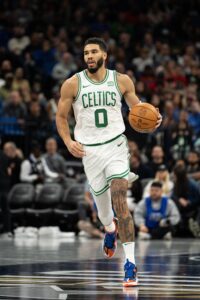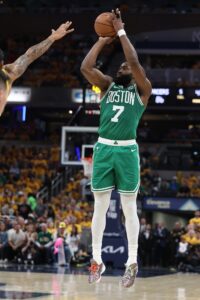Until a team wins a championship once, there will be skepticism about their ability to do it at all. That’s why the Nuggets were considered the title favorites by many NBA fans for most of the 2023/24 season after we saw them claim the Larry O’Brien trophy in ’22/23. But with the benefit of hindsight, it seems pretty clear that the Celtics were the league’s best team from start to finish this past season.
 After adding Kristaps Porzingis and Jrue Holiday to an already formidable core led by Jayson Tatum and Jaylen Brown, the Celtics opened the campaign by winning their first five games and 26 of their first 32. They held the No. 1 seed in the East for all but six of the 174 days in the regular season, and never relinquished that top spot after November 14. Their net rating of +11.7 was the third-best mark in NBA history and was 6.8 points per 100 possessions better than any other team in the East. Their 64-18 regular season record was the best in the NBA by seven games — and the best in the East by 14 games.
After adding Kristaps Porzingis and Jrue Holiday to an already formidable core led by Jayson Tatum and Jaylen Brown, the Celtics opened the campaign by winning their first five games and 26 of their first 32. They held the No. 1 seed in the East for all but six of the 174 days in the regular season, and never relinquished that top spot after November 14. Their net rating of +11.7 was the third-best mark in NBA history and was 6.8 points per 100 possessions better than any other team in the East. Their 64-18 regular season record was the best in the NBA by seven games — and the best in the East by 14 games.
The Celtics suffered a surprising loss at home to a Heat team without Jimmy Butler in Game 2 of the first round of the playoffs, raising some concerns that the postseason struggles which reared their heads in recent seasons might resurface this spring. But Boston quickly shut down those questions by reeling off 14 wins in their next 15 games despite missing Porzingis due a calf strain for most of those contests.
Following one more blip in an otherwise dominant playoff run (a 38-point loss to Dallas in Game 4), the Celtics won Game 5 of the NBA Finals at home in Boston, securing their record-setting 18th championship — it was the team’s first since 2008 and the first for Brown and Tatum, who had previously made it to one NBA Finals and multiple Eastern Conference finals without getting over the hump.
Brown, Tatum, and these Celtics have gotten the monkey on their backs with this championship, but it’ll be replaced with a target for the 2024/25 season — the NBA’s other 29 clubs know that Boston is the team to beat, especially since the Celtics are set up to keep their core intact for at least next season and potentially more years beyond that.
Brown and Holiday are already on long-term deals and Tatum will soon join them. Porzingis also has multiple years left on his contract, leaving Derrick White as the only member of the league’s best starting five who will enter 2024/25 on an expiring deal. It’s safe to assume an extension for White will be among the top offseason priorities in Boston. What else will be on the itinerary for the Celtics this summer? Let’s dive in…
The Celtics’ Offseason Plan
In addition to having their entire starting lineup under contract for 2024/25, the Celtics won’t have to worry about their top three reserves — Al Horford has one more year left on his deal, Payton Pritchard has a team-friendly four-year extension going into effect this summer, and Sam Hauser has a minimum-salary team option for next season.
Pritchard is locked in for a while and the Celtics can go year by year with Horford if he wants to play beyond next season, but the team may need to address Hauser’s contract this summer. Exercising his team option would make him a bargain for one more year, but would put him on track to hit unrestricted free agency in 2025. Declining Hauser’s option would allow the Celtics to control his restricted free agency this summer but would mean paying significantly more than the minimum for him in ’24/25 (especially after accounting for the accompanying tax penalties).
The best-case scenario for Boston would be to pick up Hauser’s inexpensive option and sign him to a longer-term extension that goes into effect in 2025/26 in order to ensure he doesn’t hit the open market a year from now. The 26-year-old has made at least 41.8% of his three-point attempts in all three of his NBA seasons and isn’t a sieve on defense, so he’s a valuable role player, and as long as they remain over the second tax apron, the Celtics won’t be in position to add an equivalent replacement if they lose him.
Beyond those top eight players, the Celtics have 2024 deadline acquisition Jaden Springer and 2023 draftee Jordan Walsh on guaranteed contracts. Boston gave up a second-round pick to acquire Springer, a talented perimeter defender who has yet to show much on offense in his three NBA seasons, and used a high second-rounder (No. 38 overall) to select Walsh, who played just nine NBA games as a rookie. They haven’t shown yet that they can be reliable rotation players, but they’re still just 21 and 20 years old, respectively — the C’s will likely be patient with them.
That leaves five open spots on Boston’s 15-man roster for next season. I expect the Celtics to carry just 14 men into the regular season to maintain flexibility for a possible in-season addition and to save a little money toward the end-of-season tax bill, so let’s say there are four other spots to fill.
One of those openings will likely be taken by a rookie. The Celtics control the No. 30 pick in this year’s draft, which is a good spot to be in from a financial perspective. They’ll either get the least expensive first-rounder of 2024 or will trade down for a second-rounder who will have an even more modest cap hit. In either case, the player will be on a cost-controlled contract for the next three or four years. Boston should have its choice in that range between a more seasoned prospect who could potentially contribute in his rookie season and a higher-upside play who might take some time to develop.
The Celtics’ free agents include Luke Kornet, Xavier Tillman, Svi Mykhailiuk, Oshae Brissett (who is expected to decline his player option), and Neemias Queta (who has a team option). I imagine Boston would welcome back both Kornet and Tillman if they’re willing to sign for the minimum. The team, which will hold both players’ Bird rights, may even be prepared to go higher than that to bring them back.
Porzingis and Horford will handle most of the minutes at center when they’re healthy, but it would be a surprise if either one played 70+ regular season games. Even when they’re healthy, the Celtics will want to manage their minutes, so it will behoove the club to have effective backup fives who won’t bristle at receiving inconsistent minutes. Of the two free agent bigs, I’d view Kornet as more likely to return, since I expect Tillman to draw interest from teams looking to spend their bi-annual exception or split up their mid-level exception.
While Brissett and Mykhailiuk didn’t play much, having reliable depth on the wing to call upon when needed was important. If one or both players seek out situations where they might get a chance to play more, the Celtics will return to the minimum-salary market in search of potential bargains. Cedi Osman is one hypothetical target I like quite a bit, but he’d have to be willing to accept a pay cut and a possible role reduction to chase a title.
The offseason plan I’ve outlined so far doesn’t feature much excitement or many roster changes. Maybe I’m wrong about that, given Brad Stevens‘ history of deal-making. But the second apron places real restrictions on what teams are able to do — neither the Porzingis deal nor the Holiday acquisition from last offseason would be at all possible for the Celtics under the new rules, which restrict second-apron teams from aggregating player salaries and from taking back more salary in trades than they send out. Plus, Stevens and the front office should feel less compelled to take big swings now that they know this team is capable of winning a championship.
As a result, the biggest deals of the Celtics’ offseason could be contract extensions. Tatum is now eligible to sign a five-year super-max extension that will begin in 2025/26 and projects to be worth an eye-popping $314.9MM (assuming a $141MM cap in ’24/25 and a 10% increase the following year). It’s safe to assume Boston will put that deal on the table and that Tatum will sign it, surpassing his teammate Brown for the biggest projected contract in league history.
It may not be quite so simple to lock up White, whose maximum four-year extension would be worth approximately $126MM. That’s a fair offer and he may well accept it, but after playing such a crucial role on this year’s title team and earning his second consecutive All-Defensive nod, the veteran guard would also be justified in believing that a bigger payday could be out there if he waits until the end of his current contract in 2025 to test the market. I expect the Celtics to do all they can to get White to sign this offseason, including perhaps adding a fourth-year player option in their offer.
Salary Cap Situation
Guaranteed Salary
 Jaylen Brown ($49,350,000)
Jaylen Brown ($49,350,000)
- Brown’s cap hit is a tentative figure based on 35% of a projected $141MM cap.
- Jayson Tatum ($34,848,340)
- Jrue Holiday ($30,000,000)
- Kristaps Porzingis ($29,268,293)
- Derrick White ($20,071,429)
- White’s cap hit includes an $18,821,429 base salary and $1,250,000 in likely incentives.
- Al Horford ($9,500,000)
- Payton Pritchard ($6,696,429)
- Jaden Springer ($4,018,363)
- Jordan Walsh ($1,891,857)
- Total: $185,644,711
Non-Guaranteed Salary
- None
Dead/Retained Salary
- None
Player Options
- Oshae Brissett ($2,463,946): Non-Bird rights
- Brissett reportedly intends to decline this option.
- Total: $2,463,946
Team Options
- Neemias Queta ($2,196,970): Non-Bird rights
- Sam Hauser ($2,092,344): Bird rights
- Total: $4,289,314
Restricted Free Agents
- None
Two-Way Free Agents
Note: Because he has finished each of the past two seasons on a two-way contract with the Celtics, Davison’s qualifying offer would be worth his minimum salary (projected to be $2,093,637). It would include a small partial guarantee.
Draft Picks
- No. 30 overall pick ($2,501,640 cap hold)
- No. 54 overall pick (no cap hold)
- Total (cap holds): $2,501,640
Extension-Eligible Players
- Sam Hauser (veteran)
- Team option must be exercised.
- Jaden Springer (rookie scale)
- Jayson Tatum (veteran; super-max)
- Xavier Tillman (veteran)
- Extension-eligible until June 30.
- Derrick White (veteran)
Note: Unless otherwise indicated, these players are eligible for extensions beginning in July.
Unrestricted Free Agents
- Luke Kornet ($2,093,637 cap hold): Bird rights
- Svi Mykhailiuk ($2,093,637 cap hold): Non-Bird rights
- Xavier Tillman ($2,093,637 cap hold): Bird rights
- Total (cap holds): $6,280,911
Other Cap Holds
- Blake Griffin ($2,093,637 cap hold)
- Mfiondu Kabengele ($1,867,722 cap hold)
- Total (cap holds): $3,961,359
Note: The cap holds for these players are on the Celtics’ books from prior seasons because they haven’t been renounced. They can’t be used in a sign-and-trade deal.
Cap Exceptions Available
Note: The Celtics project to operate over the cap and over the second tax apron. That means they won’t have access to the mid-level exception, the bi-annual exception, or any of their three existing trade exceptions. If they were to dip below the second apron, they would gain access to the taxpayer mid-level exception ($5,183,000).
- None
 Finch has agreed on a four-year contract extension through the 2027/28 season. The team
Finch has agreed on a four-year contract extension through the 2027/28 season. The team  It’s long been anticipated that Anunoby would test the free agent waters. He’ll be one of the most coveted players on the market,
It’s long been anticipated that Anunoby would test the free agent waters. He’ll be one of the most coveted players on the market,